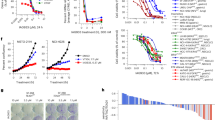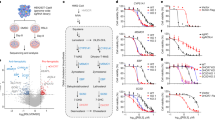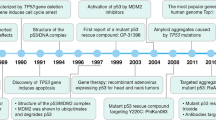Abstract
Choline is an essential anabolic substrate for the synthesis of phospholipids. Choline kinase phosphorylates choline to phosphocholine that serves as a precursor for the production of phosphatidylcholine, the major phospholipid constituent of membranes and substrate for the synthesis of lipid signaling molecules. Nuclear magnetic resonance (NMR)-based metabolomic studies of human tumors have identified a marked increase in the intracellular concentration of phosphocholine relative to normal tissues. We postulated that the observed intracellular pooling of phosphocholine may be required to sustain the production of the pleiotropic lipid second messenger, phosphatidic acid. Phosphatidic acid is generated from the cleavage of phosphatidylcholine by phospholipase D2 and is a key activator of the mitogen-activated protein kinase (MAPK) and phosphatidylinositol 3-kinase (PI3K)/AKT survival signaling pathways. In this study we show that the steady-state concentration of phosphocholine is increased by the ectopic expression of oncogenic H-RasV12 in immortalized human bronchial epithelial cells. We then find that small interfering RNA (siRNA) silencing of choline kinase expression in transformed HeLa cells completely abrogates the high concentration of phosphocholine, which in turn decreases phosphatidylcholine, phosphatidic acid and signaling through the MAPK and PI3K/AKT pathways. This simultaneous reduction in survival signaling markedly decreases the anchorage-independent survival of HeLa cells in soft agar and in athymic mice. Last, we confirm the relative importance of phosphatidic acid for this pro-survival effect as phosphatidic acid supplementation fully restores MAPK signaling and partially rescues HeLa cells from choline kinase inhibition. Taken together, these data indicate that the pooling of phosphocholine in cancer cells may be required to provide a ready supply of phosphatidic acid necessary for the feed-forward amplification of cancer survival signaling pathways.
This is a preview of subscription content, access via your institution
Access options
Subscribe to this journal
Receive 50 print issues and online access
$259.00 per year
only $5.18 per issue
Buy this article
- Purchase on Springer Link
- Instant access to full article PDF
Prices may be subject to local taxes which are calculated during checkout








Similar content being viewed by others
References
Ackerstaff E, Glunde K, Bhujwalla ZM . (2003). Choline phospholipid metabolism: a target in cancer cells? J Cell Biochem 90: 525–533.
Al-Saffar NM, Troy H, Ramirez de Molina A, Jackson LE, Madhu B, Griffiths JR et al. (2006). Noninvasive magnetic resonance spectroscopic pharmacodynamic markers of the choline kinase inhibitor MN58b in human carcinoma models. Cancer Res 66: 427–434.
Aoyama C, Liao H, Ishidate K . (2004). Structure and function of choline kinase isoforms in mammalian cells. Prog Lipid Res 43: 266–281.
Aoyama C, Ohtani A, Ishidate K . (2002). Expression and characterization of the active molecular forms of choline/ethanolamine kinase-alpha and -beta in mouse tissues, including carbon tetrachloride-induced liver. Biochem J 363: 777–784.
Avruch J, Khokhlatchev A, Kyriakis JM, Luo Z, Tzivion G, Vavvas D et al. (2001). Ras activation of the Raf kinase: tyrosine kinase recruitment of the MAP kinase cascade. Recent Prog Horm Res 56: 127–155.
Banez-Coronel M, de Molina AR, Rodriguez-Gonzalez A, Sarmentero J, Ramos MA, Garcia-Cabezas MA et al (2008). Choline kinase alpha depletion selectively kills tumoral cells. Curr Cancer Drug Targets 8: 709–719.
Bos JL . (1989). ras oncogenes in human cancer: a review. Cancer Res 49: 4682–4689.
Buchanan FG, McReynolds M, Couvillon A, Kam Y, Holla VR, Dubois RN et al. (2005). Requirement of phospholipase D1 activity in H-RasV12-induced transformation. Proc Natl Acad Sci USA 102: 1638–1642.
Carracedo A, Ma L, Teruya-Feldstein J, Rojo F, Salmena L, Alimonti A et al. (2008). Inhibition of mTORC1 leads to MAPK pathway activation through a PI3K-dependent feedback loop in human cancer. J Clin Invest 118: 3065–3074.
de Molina AR, Banez-Coronel M, Gutierrez R, Rodriguez-Gonzalez A, Olmeda D, Megias D et al (2004). Choline kinase activation is a critical requirement for the proliferation of primary human mammary epithelial cells and breast tumor progression. Cancer Res 64: 6732–6739.
Degani H, Horowitz A, Itzchak Y . (1986). Breast tumors: evaluation with P-31 MR spectroscopy. Radiology 161: 53–55.
Eliyahu G, Kreizman T, Degani H . (2007). Phosphocholine as a biomarker of breast cancer: molecular and biochemical studies. Int J Cancer 120: 1721–1730.
Exton JH . (1990). Signaling through phosphatidylcholine breakdown. J Biol Chem 265: 1–4.
Fang Y, Vilella-Bach M, Bachmann R, Flanigan A, Chen J . (2001). Phosphatidic acid-mediated mitogenic activation of mTOR signaling. Science 294: 1942–1945.
Foster DA, Xu L . (2003). Phospholipase D in cell proliferation and cancer. Mol Cancer Res 1: 789–800.
Glunde K, Bhujwalla ZM . (2007). Choline kinase alpha in cancer prognosis and treatment. Lancet Oncol 8: 855–857.
Glunde K, Jacobs MA, Bhujwalla ZM . (2006). Choline metabolism in cancer: implications for diagnosis and therapy. Expert Rev Mol Diagn 6: 821–829.
Glunde K, Raman V, Mori N, Bhujwalla ZM . (2005). RNA interference-mediated choline kinase suppression in breast cancer cells induces differentiation and reduces proliferation. Cancer Res 65: 11034–11043.
Grant S . (2008). Cotargeting survival signaling pathways in cancer. J Clin Invest 118: 3003–3006.
Hanahan D, Weinberg RA . (2000). The hallmarks of cancer. Cell 100: 57–70.
Hancock JF . (2007). PA promoted to manager. Nat Cell Biol 9: 615–617.
Hernandez-Alcoceba R, Fernandez F, Lacal JC . (1999). in vivo antitumor activity of choline kinase inhibitors: a novel target for anticancer drug discovery. Cancer Res 59: 3112–3118.
Hernandez-Alcoceba R, Saniger L, Campos J, Nunez MC, Khaless F, Gallo MA et al. (1997). Choline kinase inhibitors as a novel approach for antiproliferative drug design. Oncogene 15: 2289–2301.
Iero M, Valenti R, Huber V, Filipazzi P, Parmiani G, Fais S et al. (2008). Tumour-released exosomes and their implications in cancer immunity. Cell Death Differ 15: 80–88.
Ihle NT, Powis G . (2009). Take your PIK: phosphatidylinositol 3-kinase inhibitors race through the clinic and toward cancer therapy. Mol Cancer Ther 8: 1–9.
Iorio E, Mezzanzanica D, Alberti P, Spadaro F, Ramoni C, D′Ascenzo S et al. (2005). Alterations of choline phospholipid metabolism in ovarian tumor progression. Cancer Res 65: 9369–9376.
Kinkade CW, Castillo-Martin M, Puzio-Kuter A, Yan J, Foster TH, Gao H et al. (2008). Targeting AKT/mTOR and ERK MAPK signaling inhibits hormone-refractory prostate cancer in a preclinical mouse model. J Clin Invest 118: 3051–3064.
Li G, D′Souza-Schorey C, Barbieri MA, Cooper JA, Stahl PD . (1997). Uncoupling of membrane ruffling and pinocytosis during Ras signal transduction. J Biol Chem 272: 10337–10340.
Luo J, Manning BD, Cantley LC . (2003). Targeting the PI3K-Akt pathway in human cancer: rationale and promise. Cancer Cell 4: 257–262.
Malito E, Sekulic N, Too WC, Konrad M, Lavie A . (2006). Elucidation of human choline kinase crystal structures in complex with the products ADP or phosphocholine. J Mol Biol 364: 136–151.
Martinelli G, Iacobucci I, Paolini S, Ottaviani E . (2008). Farnesyltransferase inhibition in hematologic malignancies: the clinical experience with tipifarnib. Clin Adv Hematol Oncol 6: 303–310.
Mazie AR, Spix JK, Block ER, Achebe HB, Klarlund JK . (2006). Epithelial cell motility is triggered by activation of the EGF receptor through phosphatidic acid signaling. J Cell Sci 119: 1645–1654.
McCubrey JA, Steelman LS, Abrams SL, Lee JT, Chang F, Bertrand FE et al. (2006). Roles of the RAF/MEK/ERK and PI3K/PTEN/AKT pathways in malignant transformation and drug resistance. Adv Enzyme Regul 46: 249–279.
McCubrey JA, Steelman LS, Franklin RA, Abrams SL, Chappell WH, Wong EW et al. (2007). Targeting the RAF/MEK/ERK, PI3K/AKT and p53 pathways in hematopoietic drug resistance. Adv Enzyme Regul 47: 64–103.
Nozawa S, Ohno T, Banno Y, Dohjima T, Wakahara K, Fan DG et al. (2005). Inhibition of platelet-derived growth factor-induced cell growth signaling by a short interfering RNA for EWS-Fli1 via down-regulation of phospholipase D2 in Ewing sarcoma cells. J Biol Chem 280: 27544–27551.
Omerovic J, Hammond DE, Clague MJ, Prior IA . (2008). Ras isoform abundance and signalling in human cancer cell lines. Oncogene 27: 2754–2762.
Onodera K, Okubo A, Yasumoto K, Suzuki T, Kimura G, Nomoto K . (1986). 31P nuclear magnetic resonance analysis of lung cancer: the perchloric acid extract spectrum. Jpn J Cancer Res 77: 1201–1206.
Pal SK, Figlin RA, Reckamp KL . (2008). The role of targeting mammalian target of rapamycin in lung cancer. Clin Lung Cancer 9: 340–345.
Ramirez de Molina A, Gallego-Ortega D, Sarmentero J, Banez-Coronel M, Martin-Cantalejo Y, Lacal JC . (2005). Choline kinase is a novel oncogene that potentiates RhoA-induced carcinogenesis. Cancer Res 65: 5647–5653.
Ramirez de Molina A, Penalva V, Lucas L, Lacal JC . (2002a). Regulation of choline kinase activity by Ras proteins involves Ral-GDS and PI3K. Oncogene 21: 937–946.
Ramirez de Molina A, Rodriguez-Gonzalez A, Gutierrez R, Martinez-Pineiro L, Sanchez J, Bonilla F et al. (2002b). Overexpression of choline kinase is a frequent feature in human tumor-derived cell lines and in lung, prostate, and colorectal human cancers. Biochem Biophys Res Commun 296: 580–583.
Ramirez de Molina A, Rodriguez-Gonzalez A, Lacal JC . (2004). From Ras signalling to ChoK inhibitors: a further advance in anticancer drug design. Cancer Lett 206: 137–148.
Ramirez de Molina A, Sarmentero-Estrada J, Belda-Iniesta C, Taron M, Ramirez de Molina V, Cejas P et al. (2007). Expression of choline kinase alpha to predict outcome in patients with early-stage non-small-cell lung cancer: a retrospective study. Lancet Oncol 8: 889–897.
Rizzo M, Romero G . (2002). Pharmacological importance of phospholipase D and phosphatidic acid in the regulation of the mitogen-activated protein kinase cascade. Pharmacol Ther 94: 35–50.
Rizzo MA, Shome K, Vasudevan C, Stolz DB, Sung TC, Frohman MA et al. (1999). Phospholipase D and its product, phosphatidic acid, mediate agonist-dependent raf-1 translocation to the plasma membrane and the activation of the mitogen-activated protein kinase pathway. J Biol Chem 274: 1131–1139.
Rizzo MA, Shome K, Watkins SC, Romero G . (2000). The recruitment of Raf-1 to membranes is mediated by direct interaction with phosphatidic acid and is independent of association with Ras. J Biol Chem 275: 23911–23918.
Rodriguez-Gonzalez A, de Molina AR, Fernandez F, Ramos MA, Nunez Mdel C, Campos J et al. (2003a). Inhibition of choline kinase as a specific cytotoxic strategy in oncogene-transformed cells. Oncogene 22: 8803–8812.
Rodriguez-Gonzalez A, Ramirez de Molina A, Fernandez F, Ramos MA, del Carmen Nunez M, Campos J et al. (2003b). Inhibition of choline kinase as a specific cytotoxic strategy in oncogene-transformed cells. Oncogene 22: 8803–8812.
Sebolt-Leopold JS, Herrera R . (2004). Targeting the mitogen-activated protein kinase cascade to treat cancer. Nat Rev Cancer 4: 937–947.
Soejima K, Fang W, Rollins BJ . (2003). DNA methyltransferase 3b contributes to oncogenic transformation induced by SV40T antigen and activated Ras. Oncogene 22: 4723–4733.
Telang S, Lane AN, Nelson KK, Arumugam S, Chesney J . (2007). The oncoprotein H-RasV12 increases mitochondrial metabolism. Mol Cancer 6: 77.
Telang S, Yalcin A, Clem AL, Bucala R, Lane AN, Eaton JW et al. (2006). Ras transformation requires metabolic control by 6-phosphofructo-2-kinase. Oncogene 25: 7225–7234.
Thornburg JM, Nelson KK, Clem BF, Lane AN, Arumugam S, Simmons A et al. (2008). Targeting aspartate aminotransferase in breast cancer. Breast Cancer Res 10: R84.
Toschi A, Lee E, Xu L, Garcia A, Gadir N, Foster DA . (2009). Regulation of mTORC1 and mTORC2 complex assembly by phosphatidic acid—competition with rapamycin. Mol Cell Biol 29: 1411–1420.
Vieira AV, Lamaze C, Schmid SL . (1996). Control of EGF receptor signaling by clathrin-mediated endocytosis. Science 274: 2086–2089.
Wilhelm SM, Adnane L, Newell P, Villanueva A, Llovet JM, Lynch M . (2008). Preclinical overview of sorafenib, a multikinase inhibitor that targets both Raf and VEGF and PDGF receptor tyrosine kinase signaling. Mol Cancer Ther 7: 3129–3140.
Yuan TL, Cantley LC . (2008). PI3K pathway alterations in cancer: variations on a theme. Oncogene 27: 5497–5510.
Zhao C, Du G, Skowronek K, Frohman MA, Bar-Sagi D . (2007). Phospholipase D2-generated phosphatidic acid couples EGFR stimulation to Ras activation by Sos. Nat Cell Biol 9: 706–712.
Acknowledgements
We gratefully acknowledge helpful discussions with Drs Binks Wattenberg, Mary Roth and Otto Grubraw. This work was supported by the James Graham Brown Cancer Center and by the following grants: NIH 1 R01 CA11642801 (JC) and the Kentucky Lung Cancer Research Program (JC).
Author information
Authors and Affiliations
Corresponding author
Rights and permissions
About this article
Cite this article
Yalcin, A., Clem, B., Makoni, S. et al. Selective inhibition of choline kinase simultaneously attenuates MAPK and PI3K/AKT signaling. Oncogene 29, 139–149 (2010). https://doi.org/10.1038/onc.2009.317
Received:
Revised:
Accepted:
Published:
Issue Date:
DOI: https://doi.org/10.1038/onc.2009.317
Keywords
This article is cited by
-
Myricetin ameliorates the IL-21-induced tumorigenic phenotype of adjuvant-induced arthritis FLS by modulating the choline kinase signaling cascade
In Vitro Cellular & Developmental Biology - Animal (2023)
-
A drug–biomarker interaction model to predict the key targets of Scutellaria barbata D. Don in adverse-risk acute myeloid leukaemia
Molecular Diversity (2021)
-
Choline kinase inhibitors EB-3D and EB-3P interferes with lipid homeostasis in HepG2 cells
Scientific Reports (2019)
-
Molecular basis for the interaction between human choline kinase alpha and the SH3 domain of the c-Src tyrosine kinase
Scientific Reports (2019)
-
Differences in elongation of very long chain fatty acids and fatty acid metabolism between triple-negative and hormone receptor-positive breast cancer
BMC Cancer (2017)



